Health informatics is one of the fastest-growing segments in two distinct industries: healthcare and information technology (IT). As this is a relatively new field, there is currently a shortage of professionals who have the experience and expertise to step into many health informatics roles. Luckily for aspiring professionals, this means that most health informatics careers come with a competitive salary and significant job security.
Below, we take a closer look at what health informatics is, explore some of the top job titles held by those in the field, and outline the steps to breaking into the industry.
Advance Your Career in an Emerging Field
Learn how health informatics graduates use information technology to improve healthcare delivery and outcomes.
What is health informatics?
Health informatics (HI) is a discipline that straddles the information technology and healthcare industries. It is considered a subfield of information technology focused primarily on the collection, digitization, storage, retrieval, and sharing of patient records across systems, networks, and devices.
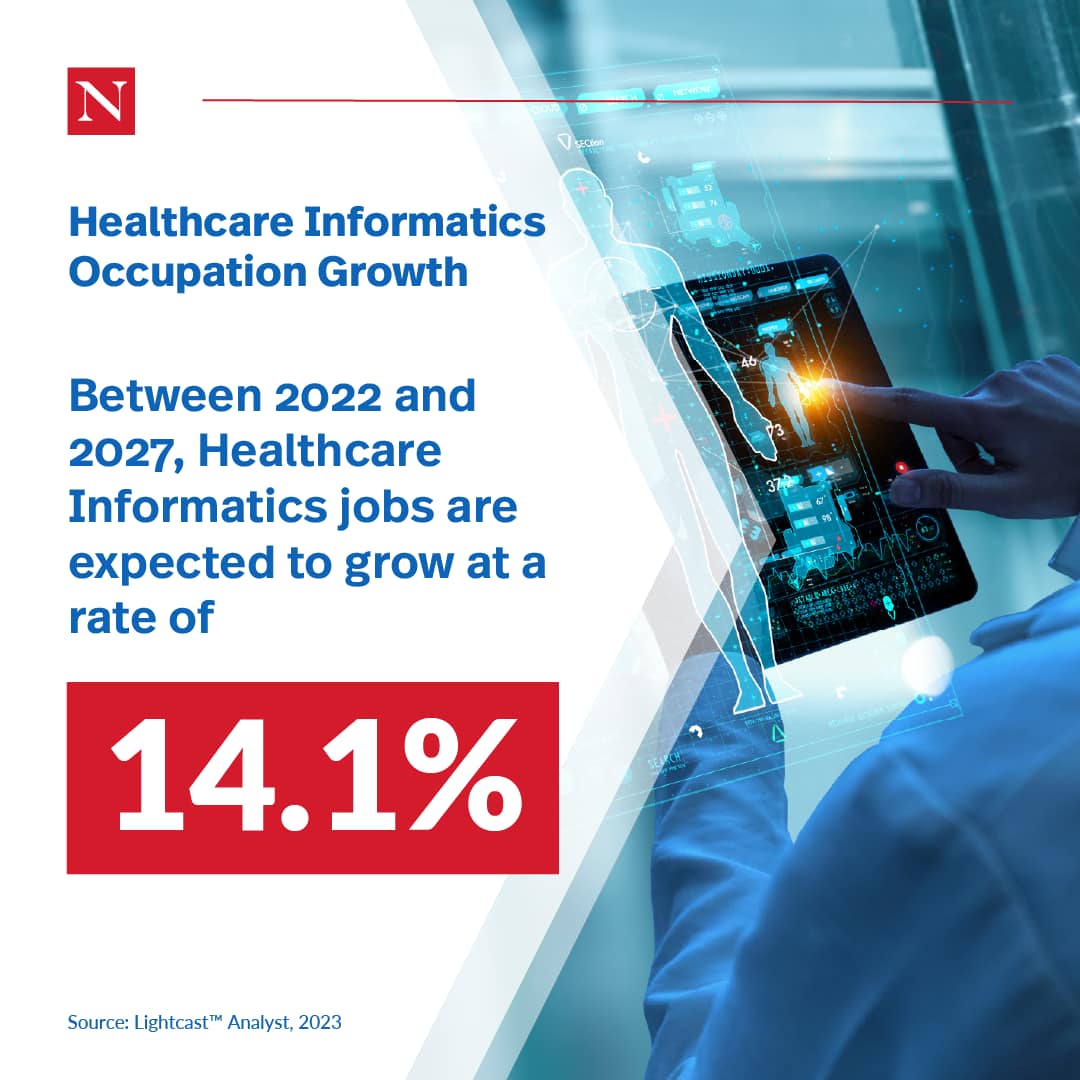
Health informatics has gained significant attention in recent years, with positions expected to grow at a rate of 14.1 percent by 2027. This is largely due to three main trends:
- The increased adoption of healthcare technology and electronic health records (EHRs) among healthcare providers
- The advent and advancement of the Internet of Things (IoT), which allows smart devices to collect and transmit data
- The evolution of telemedicine, which enables doctors and other healthcare workers to treat patients remotely
These developments have proven beneficial, especially amidst the COVID-19 pandemic that prevented many in-person health visits. However, they also introduced many questions about the security and privacy of health data. As a result, these trends have increased the demand for a variety of health informatics jobs.
Health Informatics Careers
According to our analysis of job postings data, the top six most common jobs in the health informatics industry are:
- Health/clinical informatics specialists
- Clinical informatics analysts
- Clinical informatics managers/directors
- Testing analysts
- Bioinformatics scientists
- Biostatisticians
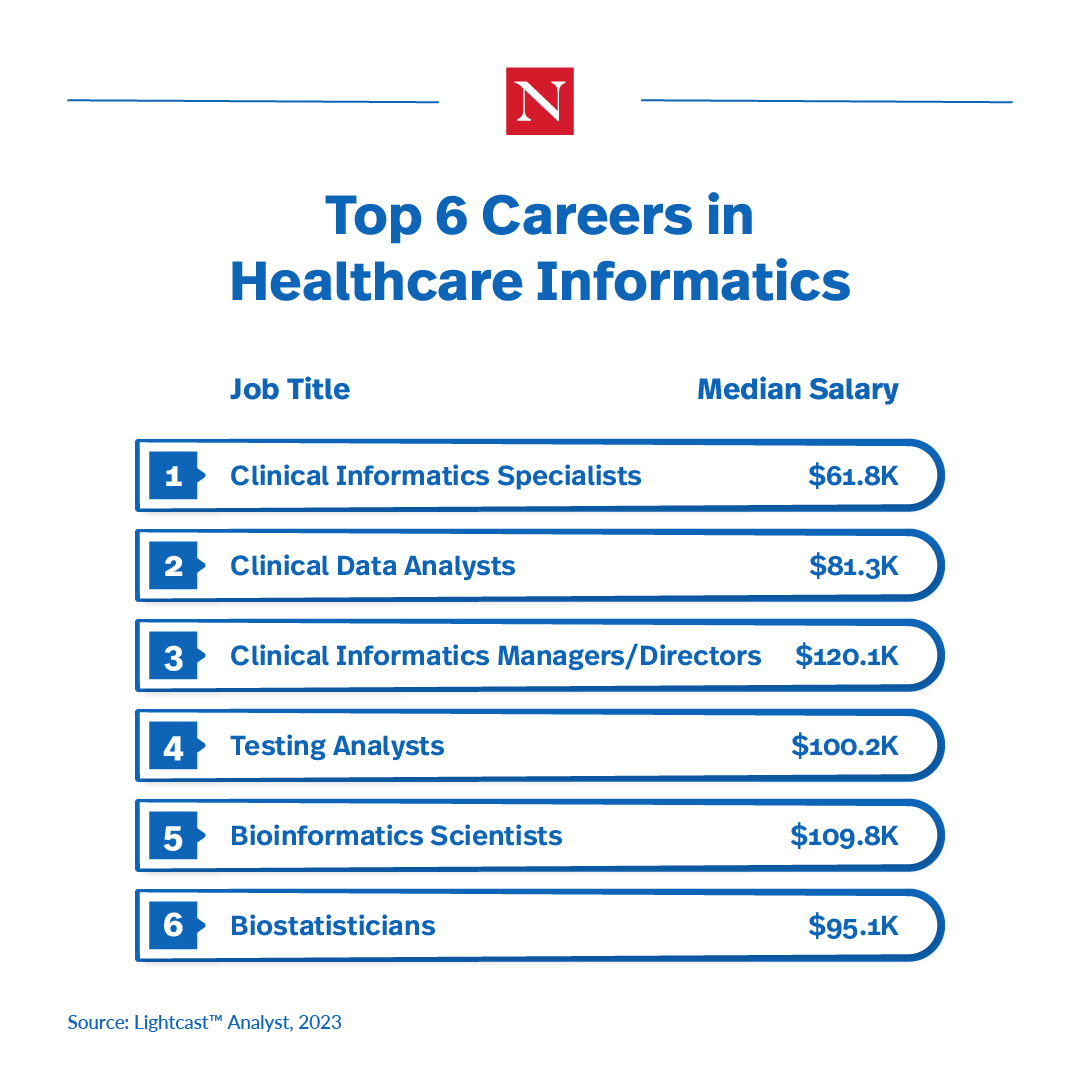
Below is an overview of these common job titles in the health informatics industry, including their responsibilities, relationship to others on the informatics team, and salary information, where available.
1. Health/Clinical Informatics Specialist
Average annual salary: $61,800 per year
A health informatics specialist works with patient records and data in a healthcare setting. They are often employed by healthcare providers such as hospitals and clinics, medical device manufacturers, pharmaceutical companies, commercial insurance companies, and governmental or other policy-focused institutions.
Because the term is something of a catch-all, it can mean different things to different employers. However, professionals in this role are typically responsible for:
- Collecting and analyzing healthcare data to answer organizational questions or solve related problems
- Managing and storing data so it’s easily accessible and understandable
- Running data reports to discover trends and share findings with others
Health informatics specialists can work in analytical, project management, consulting, or support capacities depending on an organization’s needs. This title is often held by individuals early in their career before moving into more specialized roles.
2. Clinical Informatics Analyst
Average annual salary: $81,300 per year
Clinical informatics analysts are vital healthcare professionals who typically hold the following responsibilities:
- Compiling health data
- Analyzing the previously collected data
- Using that analysis to adjust their organization’s practices, processes, and workflows to improve patient outcomes
For example, a hospital that has seen an increase in post-op readmission rates might turn to a clinical informatics analyst to identify methods for reducing that rate, which might be as simple as educating patients on proper wound care to reduce infections.
“The hottest health informatics jobs right now are related to analytics,” says Jay Spitulnik, associate teaching professor and director of Northeastern’s MS in Health Informatics. “The main reason for that is because of the growth in electronic health record (EHR) utilization over the past few years. Because of that, there are billions and billions of pieces of data that are available now. And now that we have it, we have to ask, ‘What can we do with it to help improve patient outcomes?’”
3. Clinical Informatics Manager/Director
Average annual salary: $120,100 per year
Clinical informatics managers and directors are essential leaders in the healthcare industry who are responsible for overseeing data analysis and management to improve patient outcomes.
- The key responsibilities of clinical informatics managers and directors include:
- Effectively managing health informatics specialists and other professionals on their team
- Overseeing health data analysis and data performance to ensure optimal patient care
- Monitoring the latest software and technology to keep processes efficient, and coordinating with other departments
Managers typically report to higher managers or department heads, whereas directors often report to top management.
4. Testing Analyst
Average annual salary: $100,200 per year
As technology continues to advance in the healthcare industry, there’s an increased need for skilled professionals to test these products before they hit the market. Testing analysts play a vital role in ensuring the seamless and secure operation of digital health tools. They accomplish this by performing the following tasks:
- Designing and executing tests to identify potential problems early and improve a product’s functionality
- Analyzing the data from these tests to identify any bugs and ensure the technology leads to improved health outcomes for patients
- Maintaining quality and safety standards to guarantee an excellent user-experience
Testing analysts must possess excellent analytical and problem-solving skills, an eye for detail, and strong communication abilities to be effective in their roles. It’s essential for individuals in this role to stay up-to-date with industry standards and best practices. In addition, they should have a strong understanding of healthcare technology and patient information systems, as well as the ability to interpret patient health data.
5. Bioinformatics Scientist
Average annual salary: $109,800 per year
A bioinformatics scientist primarily works on developing software applications and databases that help in analyzing biological data. In industries beyond biology and biotech, this role is most commonly linked to that of a data scientist.
Key responsibilities of a bioinformatics scientist include:
- Coordinating and collaborating with fellow scientists and other professionals in the organization
- Collecting, processing, and analyzing biological data
- Keeping accurate records of past experiments and analyses to easily review past work and inform future research endeavors
Responsibilities of day-to-day work may differ based on industry or company. Regardless of where bioinformatics scientists work, however, a thorough knowledge of healthcare informatics is critical to achieving success.
6. Biostatistician
Average annual salary: $95,100 per year
Biostatisticians are responsible for statistical design and analysis to achieve medical research breakthroughs. They work in a variety of settings, such as hospitals or research labs.
Responsibilities may include:
- Analyzing statistical data derived from research studies related to biology
- Using findings to draw conclusions and make predictions based on statistical analysis
- Creating reports that offer a concise summary of the analysis, and presenting them to team members, clients, or stakeholders
Biostatisticians tend to focus on specific areas, such as epidemiology, ecology, or genetics. The role is typically part of a larger research team, so interpersonal management and collaboration are also valuable skills.
Breaking Into Health Informatics
Professionals working in the field of health informatics are regularly rewarded with competitive salaries. Even entry-level positions such as a health informatics specialist receive a much higher salary than the national average.
If you’re interested in pursuing a career in health informatics, note that Spitulnik says most of the roles listed above require advanced education.
In addition to pursuing additional education, honing your abilities can also help you stand out from the competition. It’s important to focus on developing the necessary competencies to excel at each of these positions—both common and hard skills.
Common Skills
According to our analysis of job postings data, the top common skills—also known as soft or non job-specific skills—required for healthcare informatics roles are:
- Communications
- Leadership
- Management
- Operations
- Research
- Problem-solving
- Planning
- Coordinating
- Presentations
- Information technology
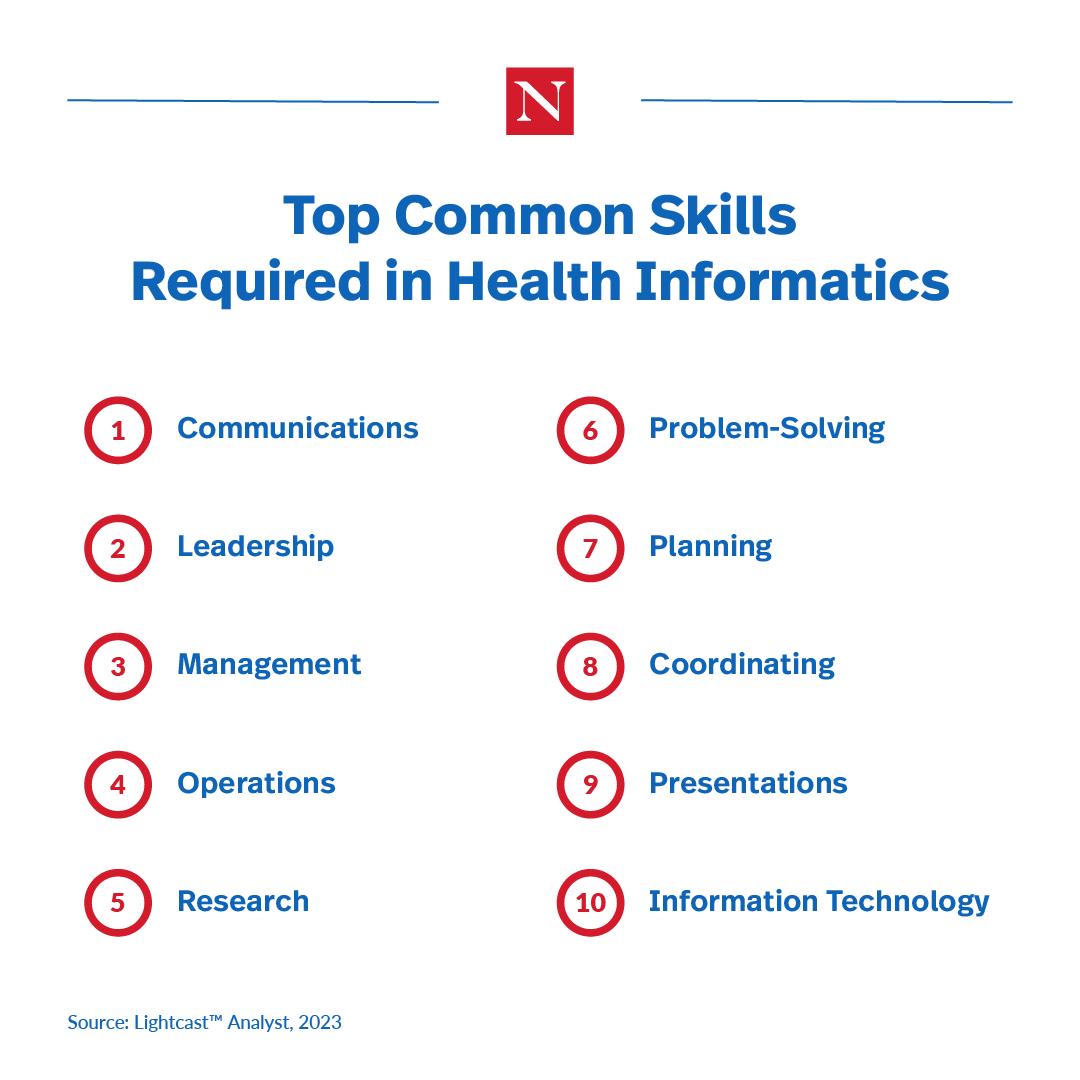
Hard Skills
Hard skills—also known as technical or job-specific skills—are also equally as important to develop. The most commonly listed hard skills in healthcare informatics-related job postings include:
- Workflow management
- Clinical informatics
- Electronic medical record
- Health informatics
- Data analysis
- Medical records
- Nursing
- Informatics
- Computer science
- Hospital information systems
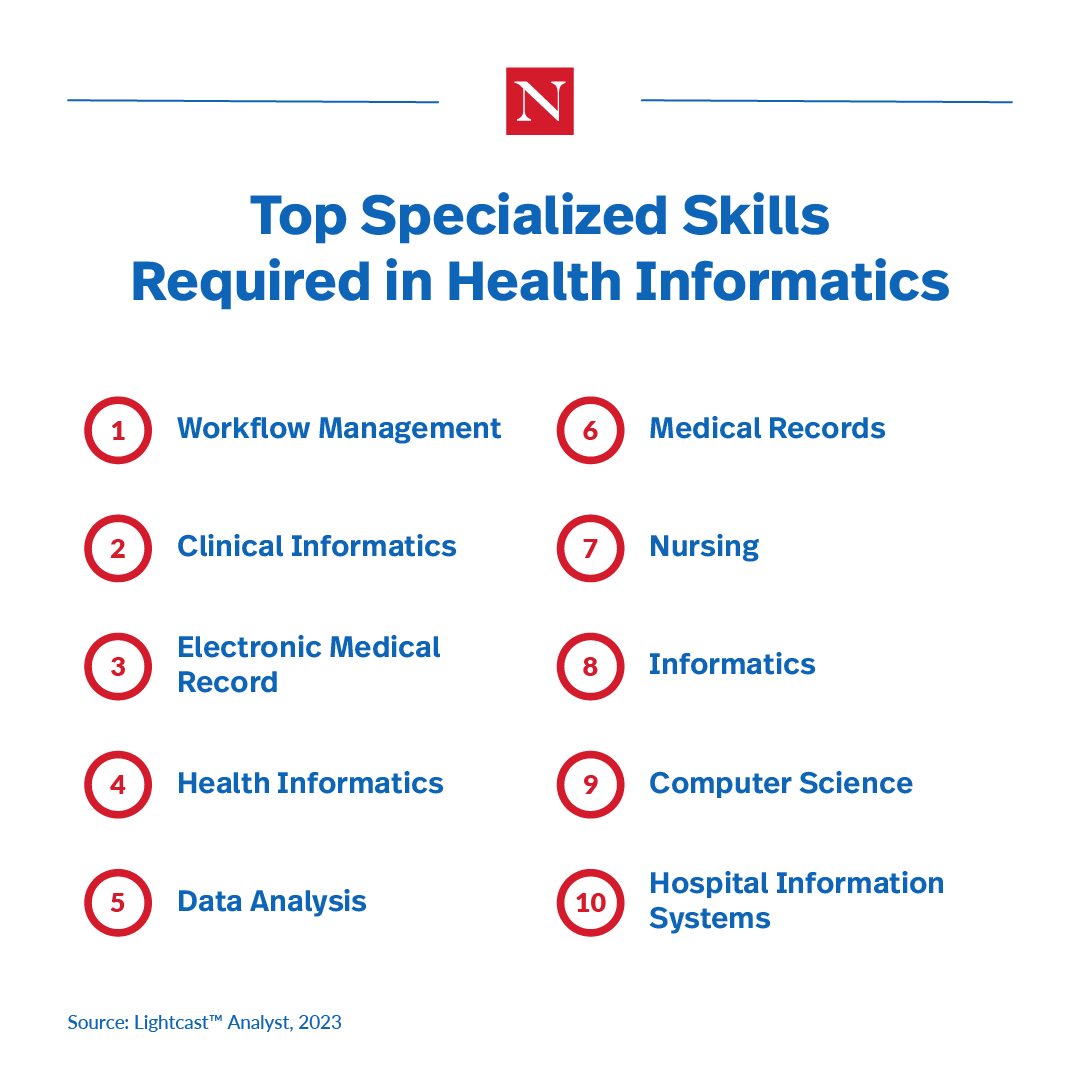
Obtaining these skills in a demonstrable way can help give you a competitive edge for prospective employers in healthcare informatics.
Taking the Next Steps in Your Health Informatics Career
There are several different degrees that can prepare you to work in an informatics role. First, there is the industry-agnostic Master of Science in Informatics degree. Others may earn a Master of Science in Information Systems and work in a general IT-focused role for some time before transitioning into the healthcare space. Another excellent route for those who are sure they want to work in health informatics is to pursue a closely aligned degree, such as a Master of Science in Health Informatics.
Spitulnik notes that, when selecting a degree, it’s critical to evaluate programs by the technical skills they provide and the “soft” skills you will have the chance to refine.
“Health informatics professionals work with people who speak entirely different professional languages,” Spitulnik says. “[Northeastern] prepares our students to be the interpreters among all those disparate groups. The clinician speaks a different language from the IT professional, who speaks a different language from the management professional, and from the patients. And so, our graduates learn to communicate effectively with all of those stakeholders, to ensure that the end result of an effort is ultimately going to be fruitful for all parties.”
To learn more about the program, explore our program page or get in touch with an enrollment coach to get your questions answered.

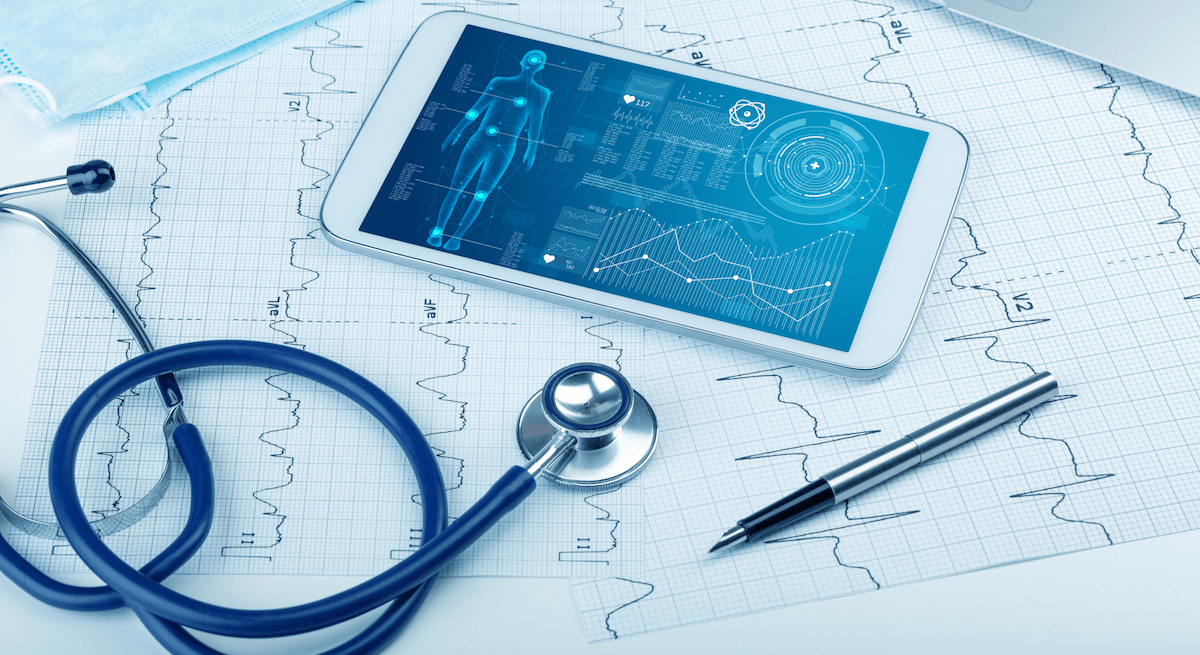
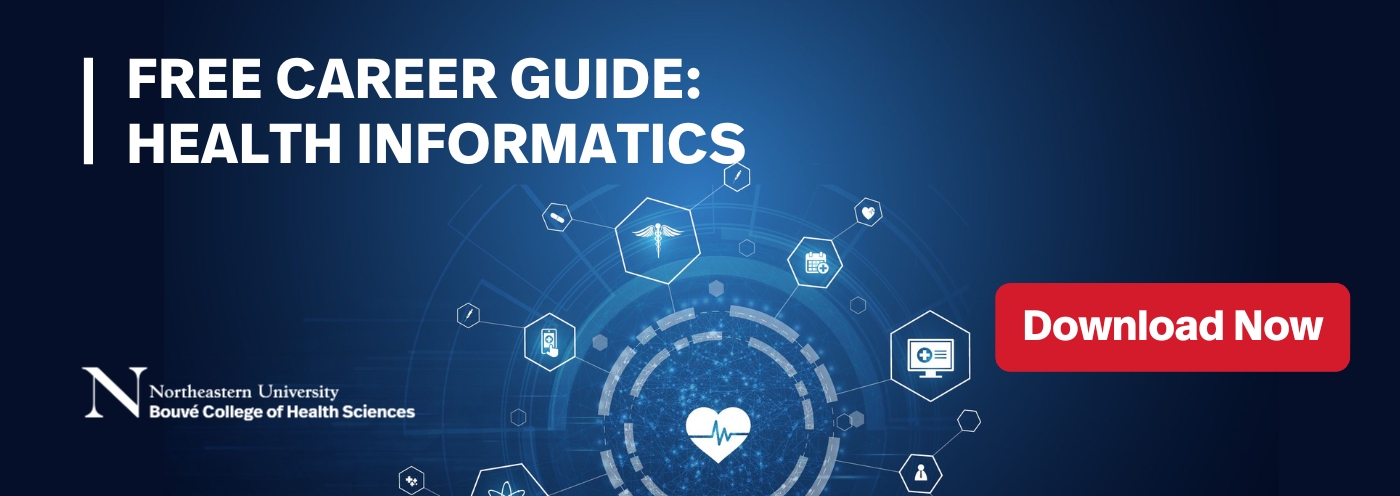




Related Articles
Is a Data Analytics Bootcamp Worth It?
What is Learning Analytics & How Can it Be Used?
How to Get Into Analytics: 5 Steps to Transition Careers